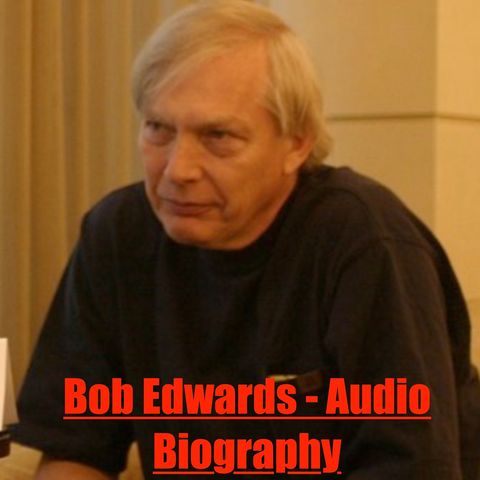12 FEB. 2024 · Bob Edwards: The Calm and Inquisitive Voice Spanning American Eras If a Mount Rushmore of great American radio broadcasters existed, Robert Alan "Bob" Edwards' (May 16, 1947 – February 10, 2024) chiseled visage would undoubtedly hold a prominent place, gazing stoically alongside fellow legends. Edwards' half-century broadcasting career defined success not by showmanship or sensationalism chasing mass popularity, but rather through steady consistency and integrity, building listener trust over generations. His smooth baritone and insatiable curiosity illuminated news big and small, high and low, as audiences tuned in daily, finding non-judgmental companionship against tumultuous backdrops in real-time. The iconic voice and values that informed National Public Radio's journalistic maturation process, championing calm factuality amidst chaos, reflected Edwards' character and passions. His avuncular delivery style felt akin to a close friend awakening listeners day after day, nudging them towards embracing problems but also possibilities lying beyond their bedroom windows as the world kept spinning onwards. From Unknown DJ to National Broadcast Seminal Career Born on May 16, 1947, in Louisville, Kentucky, Edwards developed a fascination for radio magic early on, winning high school broadcasting roles, leading the University of Louisville station, and eventually earning a communications degree, forging initial career steps. After serving in the US Army and reaching Berlin's Spandau Prison holding Nazi war criminals, Edwards pivoted fully, realizing his radio dreams by taking odd DJ jobs in Ohio and Michigan, building his chops. In 1972, fate intervened when the avant-garde upstart network National Public Radio, then headquartered in Washington D.C., recruited Edwards. His mellow, intelligent announcing stood out amidst the embryonic creative anarchy, and by 1979, management trusted him enough to spearhead the launch of their inaugural attempt at structured morning broadcasting called "Morning Edition." They hoped infusing NPR's existing cerebral aura with accessibility might broaden audiences and help finance operations long-term. Turns out, the gamble proved wise. His one-of-a-kind delivery, eschewing self-aggrandizement, connected instantaneously with audiences craving that informative yet intimate kickstart to tackle each new day armed with digestible context around unfolding current events. Edwards' conversant musings felt akin to a kindred spirit sitting shotgun, commenting on the world rolling by outside car windows rather than a stern lecturing professor or shouty shock jock yelling the latest outrage. For over 17,500 episodes spanning parts of six different decades, Edwards manned the "Morning Edition" captain's chair, slowly transforming once niche public radio into America's popular mainstream audio oasis amidst ever-fragmenting and ultra-partisan mediascapes. His steadfast companionship during chaotic eras entrenched NPR's relevance within national conversations, now expanding towards generational public support, cementing its survival long-term. When Edwards reluctantly retired from daily hosting in 2015, over 13 million devoted fans made emotional peace with no longer hearing his reassuring, measured insights kick-starting their tomorrows. Legacy Anchoring Public Radio Journalism's Maturation Edwards' career forever intertwines with public media coming-of-age, navigating between appeasing Congressional funding sources and pursuing editorial independence while tackling stories affecting underserved communities often overlooked by corporate mainstream outlets. Alongside co-host and newswoman Cokie Roberts, who was equally admired for respecting audience intelligence and discussing current affairs on equal planes rather than talking down, the duo shaped NPR's journalistic identity and aspirations: upholding fairness, seeking all perspectives, and understanding complex issues. While juggling "Morning Edition's" eminent legacy spanning presidencies and shifting sociopolitical zeitgeists, Edwards simultaneously hosted weekend programs, contributed commentaries, authored books, and led documentaries, cementing his preeminent status. His prolific dedication towards elevating NPR's excellence through wise counsel and personal example won widespread accolades, including DuPont, Edward R. Murrow, and over a dozen honorary doctorates. Edwards even described his emotions in 2005 upon returning to Louisville and witnessing the communications school renamed bearing his moniker, continuing his reputation to inspire future broadcasting generations. Throughout five decades seated at the front line, developing NPR's young reporters, they greatly benefitted from observing his sharp writing, curiosity-evoking interview style, and resolute corrections when facts wandered. His insistence on amplifying unreported voices maintained anchor-desk pressure on decision-makers frequenting his airwaves, keeping dubious power accountable daily. The Personal Side Beyond Microphones Beyond the studios, Edwards nourished rich passions since youth, such as literature and poetry, which informed the nuanced world perspectives revealed in his radio dispatches. A bookworm his entire life, often reading several tomes simultaneously, Edwards attended live theater and performances whenever possible to keep his cultural appetites nourished. Close associates Thanks for listening to Quiet Please. Remember to like and share wherever you get your podcasts. And Hey! History buffs, buckle up! Talking Time Machine isn't your dusty textbook lecture. It's where cutting-edge AI throws wild interview parties with history's iconic figures. In the Talking Time Machine podcast: History Gets a High-Tech Twist, Imagine: Napoleon Bonaparte talking French Politics with Louis the 14th! This podcast is futuristically insightful. Our AI host grills historical legends with questions based on real historical context, leading to surprising, thought-provoking, and often mind-blowing answers. Whether you're a history geek, a tech junkie, or just love a good interview, Talking Time Machine has something for you. Talking Time Machine: search, subscribe and (Listen Now!)


